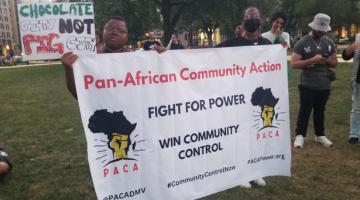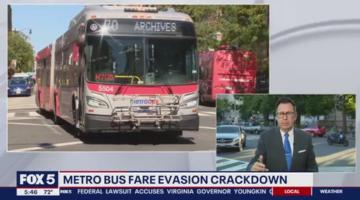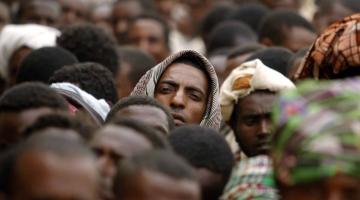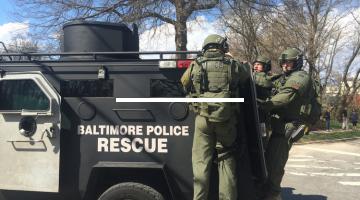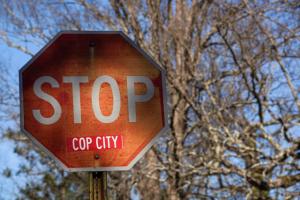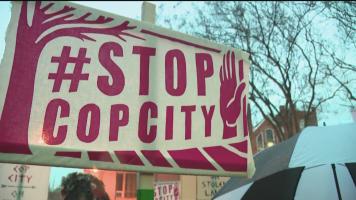Under the shield of public safety, Atlanta's police and political leaders have turned it into the most surveilled city in the country, where Black and Brown people working-class people are under a militarized microscope.
Modern technologies like facial recognition, predictive policing, and expansive surveillance networks are not mere tools of public safety; they are instruments of militarization, deeply embedded in the war against Black communities in Atlanta, the most surveilled city in the U.S. These technologies target Black poor and working class neighborhoods disproportionately, enforcing capitalist exploitation and reinforcing racial hierarchies.
Surveillance in Atlanta operates as a militarized extension of policing, transforming Black neighborhoods into domestic battlefields. Programs like Operation Shield, with over 16,000 integrated public and private cameras, exemplify this approach. Managed by the Atlanta Police Foundation (APF), this program feeds live footage into the Video Integration Center (VIC), where “predictive” analytics enable real-time tracking of Black communities, treated as "high-risk zones." The program’s use of AI-powered analytics and license plate readers mimics military strategies designed for occupied territories, criminalizing mundane activities and embedding hyper-policing into daily life.
The militarized nature of Atlanta’s surveillance infrastructure is evident in the layers of control it imposes. License plate readers scan over 300,000 plates daily, flagging “hits” for police action, while programs like the Fusus-Talitrix integration propose 24/7 GPS monitoring of individuals on pretrial release, primarily targeting Black residents. This technology mirrors digital incarceration, expanding surveillance into public spaces and turning the city into an open-air prison.
Technologies such as facial recognition, predictive policing algorithms, and geofencing draw from military-grade applications designed to identify and neutralize threats in real-time. In Atlanta, these tools are wielded disproportionately against Black communities, criminalizing mundane activities while embedding a state of hyper-policing in everyday life.
Despite claims of transparency, a 2020 audit revealed that many cameras were non-operational due to poor maintenance coordination among the APF, Atlanta Police Department, and city government. These failures undermine public safety claims but do not impede the program’s expansion, prioritizing the surveillance infrastructure necessary to wage this war.
Such militarization is not accidental. It is deeply tied to counterinsurgency tactics historically used in colonial and occupied territories. The U.S. government’s domestic adaptation of these tactics began with programs like COINTELPRO, which targeted Black liberation movements through infiltration, surveillance, and disruption. Today, Atlanta’s partnership with the Georgia International Law Enforcement Exchange (GILEE) underscores this militarized approach. By adopting strategies from militarized police forces in Israel and other countries, the Atlanta Police Department has institutionalized practices designed for control, not community safety. In fact, the Atlanta Police Department admitted that the Video Integration Center is modeled after the command and control center in the Old City of Jerusalem and mimics Israeli methods to proactively monitor crime.
Surveillance technologies in Atlanta are deeply intertwined with gentrification and settler colonialism, functioning as tools to criminalize and control Black residents while facilitating their displacement. Programs like the Westside Security Plan and Secure Neighborhoods initiative explicitly use surveillance to enforce capitalist exploitation, protecting real estate investments while marginalizing and displacing long-time Black communities. By mapping and targeting Black neighborhoods, these systems marginalize long-time residents and clear the way for the extraction of land and resources.
The $5 million Westside Security Plan, for example, targets Vine City and English Avenue, combining surveillance infrastructure with increased police presence. This initiative includes deploying 131 cameras in English Avenue and 34 in Ashview Heights and establishing the Westside Blue Unit, a specialized patrol team. These efforts create a hostile environment for Black residents, reinforcing racial and economic disparities.
During community events like Vine City Day, police selectively enforce minor infractions, using license plate readers to tow vehicles and disrupt festivities. These actions send a clear message to Black residents that their presence is unwelcome, accelerating displacement. Similarly, the Secure Neighborhoods program, which subsidizes housing for police officers in “transitional neighborhoods,” embeds law enforcement in Black neighborhoods. This initiative increases property values, further displacing low-income residents under the guise of enhancing public safety.
The Atlanta Police Foundation has been at the forefront of militarized policing initiatives since its establishment in 2003. With the largest budget, staff, and private sector board of any police foundation in the United States, the APF directly operates programs like Operation Shield, officer housing subsidies, and experimental surveillance technologies. It is also the main force behind Atlanta’s Cop City. In 2015, Atlanta was recognized as a model city by President Obama’s Task Force on 21st Century Policing — one of only 15 jurisdictions to receive this distinction. However, these accolades obscure the APF’s role in disproportionately targeting Black communities.
The roots of Atlanta’s surveillance infrastructure can be traced to the 1996 Summer Olympics. The event necessitated unprecedented coordination and resources, leading to the construction of the Atlanta City Detention Center (ACDC) and the deployment of advanced surveillance technologies. ACDC was the subject of a scathing report written by the U.S. DOJ after a civil rights investigation. These developments set a precedent for the city’s current investments in surveillance and militarized policing, which have only expanded as Atlanta prepares to host the FIFA World Cup.
In 2023, the APF pushed an unprecedented plan to integrate invasive electronic monitoring technology from Talitrix into Atlanta's surveillance network. Talitrix’s GPS-enabled “digital shackles” and biometric monitoring were slated to be integrated with Fusus’s AI-powered video surveillance, subjecting up to 900 individuals—primarily Black residents labeled as “repeat offenders”—to constant monitoring. Critics have called this plan a blatant violation of constitutional rights, likening it to turning Atlanta into an “open-air prison.”
Testing such unvetted technology on Black communities aligns with a broader historical pattern of using marginalized populations as unwitting research subjects. Over 93 percent of individuals targeted as “repeat offenders” are Black, with most cases involving non-violent offenses like drug possession. These initiatives are less about public safety and more about controlling and criminalizing Black existence.
It must be noted that surveillance technologies are deeply rooted in the legacies of slave patrols, Black Codes, and Jim Crow laws – all designed to monitor and control Black people. This history reveals that surveillance is not about public safety — it is a mechanism to maintain racial and economic hierarchies.
In Atlanta, surveillance practices have evolved into a cornerstone of militarized policing, treating Black neighborhoods as occupied zones. The pervasive monitoring creates an atmosphere of fear and compliance, forcing residents to self-regulate under the threat of police intervention. This mirrors the psychological impacts of military occupation, where surveillance suppresses dissent and resistance. The militarized nature of surveillance is evident in the way it is deployed. License plate readers, biometric tracking devices, and AI-powered analytics mimic battlefield strategies, where tracking and targeting individuals are key to maintaining control.
This is part of a broader trend in policing that includes the acquisition of military-grade equipment, such as armored vehicles and tactical gear through the 1033 Program, the construction of cop cities, and the adoption of other war-like strategies. Surveillance amplifies these tactics, providing the intelligence backbone that makes aggressive policing and mass arrests more efficient. In Atlanta, this is exemplified by the integration of technologies like Microsoft’s Operation Aware, which combines surveillance feeds, criminal databases, and facial recognition to create a seamless system of control.
Understanding surveillance as militarization reframes it as a weapon of systemic control rather than a public safety measure. It is not simply about watching people — it is about enforcing racial hierarchies, criminalizing resistance, and facilitating displacement. This framing demands a shift in focus from individual privacy violations to collective impacts on Black communities.
The pervasive surveillance infrastructure in Atlanta is not a tool for public safety—it is a weapon of war against Black and working-class communities. Framing surveillance as militarization highlights its role in a broader strategy of domination, where the logic of war is embedded into local policing practices. Black neighborhoods are domestic battlefields, perpetuating cycles of criminalization and displacement while protecting capitalist interests.
Tunde Osazua is a member of the Black Alliance for Peace’s Africa Team and the Steering Committee of the International Campaign to Free Kamau Sadiki.


